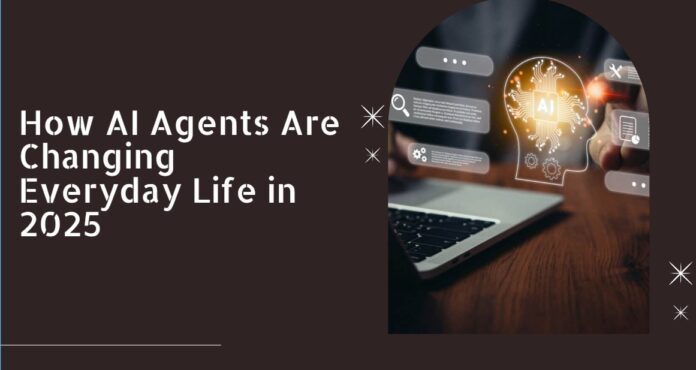In 2025, the AI agent has become one of the most important innovations shaping how people live, work, and interact with technology. Unlike simple chatbots of the past, today’s AI agents are intelligent, autonomous, and capable of learning from context. They don’t just answer questions—they anticipate needs, take proactive actions, and coordinate multiple tasks seamlessly.
From smart homes and personal health to mobility, productivity, and entertainment, AI agents are embedded in every part of life. In this blog, we’ll explore how AI agents are changing daily routines, their benefits, challenges, and what the future holds.
What Is an AI Agent in 2025?
An AI agent is a software or hardware system that can perceive its environment, process information, and make decisions to achieve goals. Powered by advanced machine learning, natural language processing, and reinforcement learning, AI agents in 2025 can:
- Understand natural conversations
- Adapt to user habits and preferences
- Perform tasks autonomously
- Integrate across devices and platforms
They are no longer limited to answering commands—they now act like true digital companions.
Everyday Applications of AI Agents
1. Personal Assistants That Anticipate Needs
AI agents on smartphones, wearables, and smart speakers don’t just wait for instructions—they predict what you need. For example:
- Reminding you to leave early due to traffic.
- Suggesting meals based on your diet and fridge inventory.
- Offering wellness breaks during long work sessions.
These personal AI agents act as life managers, streamlining daily decisions.
2. Smart Homes Powered by AI Agents
Modern homes in 2025 are orchestrated by AI agents that connect appliances, lighting, energy, and security. They can:
- Adjust room temperature and lighting automatically.
- Detect unusual activity and alert homeowners.
- Optimize energy use by running appliances at off-peak hours.
3. AI Agents in Health & Wellness
AI agents serve as personal health coaches, integrated with wearables and medical platforms. They:
- Track heart rate, sleep, stress, and activity.
- Suggest exercises or mindfulness when needed.
- Alert doctors or schedule checkups when anomalies are detected.
This constant monitoring makes healthcare more preventive and personalized.
4. AI Agents in Mobility and Travel
Transportation is one of the biggest beneficiaries of AI agents:
- Autonomous cars navigate traffic with real-time decision-making.
- Drones deliver food, medicine, and parcels faster.
- Travel agents powered by AI handle bookings, itineraries, and even real-time re-routing.
Commuting and logistics are smoother, safer, and more reliable.
5. Workplace Productivity with AI Agent
In offices, AI agents have become digital colleagues. They:
- Draft reports, emails, and presentations.
- Summarize meetings and highlight action points.
- Manage schedules based on deadlines and task urgency.
Benefits of AI Agents in Everyday Life
- Time Efficiency – Handling routine tasks automatically.
- Personalization – Tailored suggestions for lifestyle, health, and work.
- Smarter Decisions – Data-driven recommendations for better outcomes.
- Accessibility – Helping people with disabilities navigate tasks independently.
Challenges of AI Agents
While AI agents are powerful, they also raise concerns:
Privacy & Security
AI agents process sensitive personal data. Without strong protection, misuse or data breaches could occur.
Bias & Ethics
If not carefully designed, AI agents may show bias in decisions like hiring or healthcare suggestions.
Overdependence
Relying too heavily on AI agents might reduce human problem-solving skills.
Interoperability
The Future of AI Agents Beyond 2025
Looking ahead, AI agents will become even more advanced:
- Emotionally Intelligent Agents – Detecting tone, stress, and mood for empathetic responses.
- Collaborative Agent Networks – Cars, homes, and workplaces working together in harmony.
- Edge AI Agents – Operating locally on devices for faster response and better privacy.
- Legal and Ethical Standards – Governments setting rules for responsibility and accountability.
AI agents are not just tools—they’re evolving into companions that shape human experiences.
Conclusion
By 2025, the AI agent is everywhere—optimizing commutes, managing homes, safeguarding health, and boosting productivity. These agents are more proactive, intelligent, and integrated than ever before.
The rise of AI agents offers both opportunities and challenges. With the right balance of innovation, ethics, and regulation, AI agents will continue to transform everyday life—making it smarter, healthier, and more efficient.
Source link

